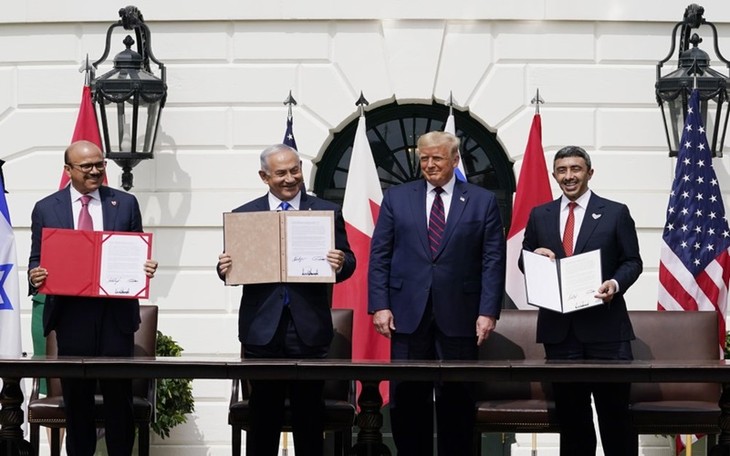(VOVWORLD) - The normalization of relations between Israel and two Arab countries has been in the spotlight this week, overshadowing other issues like the COVID-19 pandemic, Japan’s new Prime Minister, and the failed China-EU online summit. Israel’s historic signing of agreements normalizing ties with the United Arab Emirates (UAE) and Bahrain on Tuesday marks a remarkable change in the geo-political landscape of the Middle East, a hotbed of conflicts.

Bahraini Foreign Minister, Israeli Prime Minister, US President and UAE Foreign Minister (from left) during the signing ceremony of the Abraham Agreement at the White House, September 15. (Photo: AP)
|
At a ceremony attended by about 200 guests and hosted by US President Donald Trump at the White House, Israeli Prime Minister Benjamin Netanyahu signed two separate agreements. The other signatories were UAE Foreign Minister Sheikh Abdullah Bin Zayed Al Nahyan and Bahraini Foreign Minister Abdullatif Bin Rashid Al Zayani.
The UAE and Bahrain became the third and fourth Arab countries to sign an agreement to normalize relations with Israel, following Egypt in 1979 and Jordan in 1994. President Trump called the event a “major stride towards a future in which people of all faiths and backgrounds live together in peace and prosperity.” He said this event will change the course of history, marking “the new dawn of a new Middle East” after decades of division and conflict. The US President said that after the UAE and Bahrain, there will be seven to nine more Arab countries willing to agree to normalize relations with Israel.
Victory of multiple parties
Experts call this an important diplomatic victory for Mr. Trump as a peacemaker with less than 50 days to go until the presidential election in the US. It shows that the US influence in the Middle East remains strong and that Washington remains committed to the interests of its allies there.
Israel’s agreements with its former Arab foes means that the Jewish State has increasingly asserted its position and broken its isolation, gaining more strength in the confrontation with Iran, the Islamic nation who has repeatedly declared Israel an "arch foe" and wants to wipe Israel off the map.
For the UAE, normalizing relations with Israel bolster its relations with the US and gains benefits in security, economics, politics, and diplomacy.
Many countries in the region have welcomed the agreements, as a signal that cooperation and reconciliation are trending in the Middle East.
Unpredictability
But the Middle East will not achieve peace and stability overnight. The tumultuous historical context with intertwined interests between many entities is a conundrum that has defied solution for decades.
 Palestinians protest the peace agreement reached between Israel and the UEA and Bahrain. (Photo: AP) Palestinians protest the peace agreement reached between Israel and the UEA and Bahrain. (Photo: AP) |
The agreement between Israel and the two Arab states was not expected by all nations. The Palestinian Authority has condemned the agreement as a betrayal of the Palestinians. Iran and Turkey have also harshly criticized the deal, warning of the dangerous consequences it could have for regional peace. Analysts say Iran will react to the increased pressure and isolation from the US, Israel, and their allies, escalating tensions.
Saudi Arabia has persisted in supporting the Palestinians and efforts to achieve a fair and comprehensive solution to the Palestinian issue. The Saudi government vows to continue to work with the Palestinians towards a solution that will give the Palestinians their own independent state with pre-1967 borders and East Jerusalem as its capital, as specified in the Arab Peace Initiative.